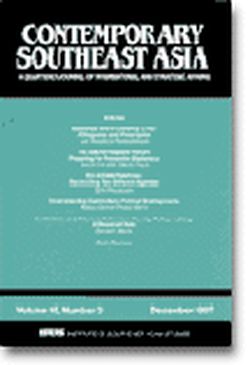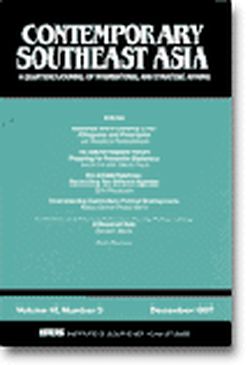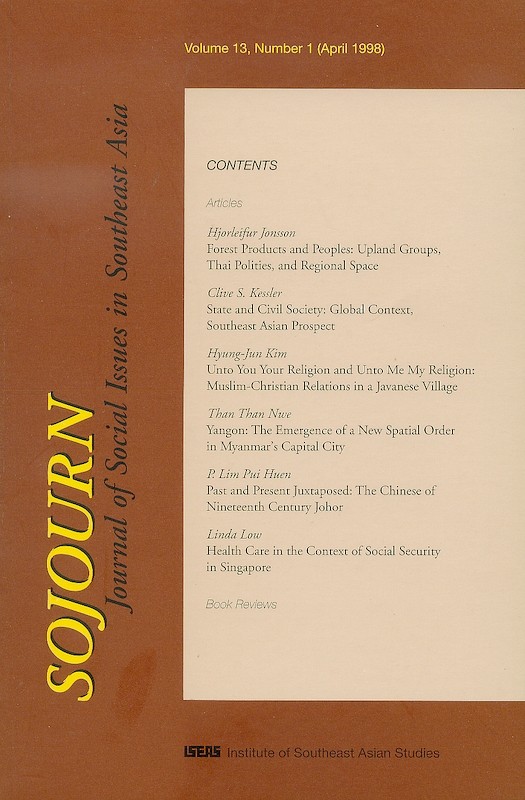Contemporary Southeast Asia: A Journal of International and Strategic Affairs Vol. 13/4(Mar 1992)

Date of publication:
March 1992
Number of pages:
103
Code:
CS13/4
Contents
-
Preliminary pages
- ARTICLES
-
Leaders, Elites and the Imperatives of Security., by Khong Cho Oon , author see abstractSecurity does not simply mean external security or military security. Political stability is a fundamental aspect of national security. Political stability depends, above all, on the leadership's relationship with the societal elite. In the bureaucratic-authoritarian model, the leadership's tendency to maximize its autonomy of action has to contend with participatory pressures from the social elite. How security is defined is influenced by agreements reached between the leadership and elite. But this is a dynamic process and questions of redistribution of power and definitions of security have to be mediated on a continuing basis. How well the leadership manages to maximize its autonomy alongside participatory pressures from the changing societal elite determines the nature and extent of political stability and the attainment of security. The leadership's critical role lies in its ability to balance its own concerns with the interests of the societal elite.
-
Sino-Thai Relations: From Strategic Co-operation to Economic Diplomacy, by Yong Deng, author see abstractThis article seeks to examine the shift of priorities in the agenda of Sino-Thai relations from a convergence of strategic interests in opposing Vietnamese occupation of Cambodia to economic diplomacy. It discusses new trends and dynamics in the bilateral relations within the post-Cambodian context since September 1989. It further provides some tentative discussions about the opportunities and difficulties in current and future Sino-Thai relations. In the light of the recent dramatic changes in Indochina, this study may be useful in understanding China's future relations with Thailand in particular, and Sino-ASEAN relations in general.
-
Nuclear and Missile Proliferation Issues: Some Approaches to Stability in South Asia, by Nazir A Kamal , author see abstractEver since the Indian atomic device test in 1974, nuclear weapons proliferation in South Asia has been a salient regional issue and a cause of increasing international concern. Another issue of growing significance is the development of ballistic missiles by India and Pakistan. Public support in both countries has been increasing for exercising the nuclear weapons option and accelerating the development of ballistic missiles. Alongside these militarization trends, the adversarial relationship between India and Pakistan has worsened. The violent unrest in Indian-held Kashmir has once again sensitized attitudes on both sides towards their major territorial dispute over Kashmir. The domestic political situation in India and Pakistan has further complicated their bilateral relations. Meanwhile, defence spending by both countries has become burdensome and a drag on their plans for economic modernization and development. Strengthening security and stability in South Asia is a Herculean task, but the imperatives for adopting new political thinking are clear and pressing. In the post-cold war situation, the role of outside powers no longer presents problems. Much depends on reciprocal acts of statesmanship by the Indian and Pakistani leadership.
-
The Religious Factor in Three Minority Movements: The Moro of the Philippines, the Malays of Thailand, and Indonesia's West Papuans, by R J May, author see abstractThis article looks at three minority subnationalist communities among the Philippine Muslims in the predominantly Christian Philippines; among the Malay Muslims in predominantly Buddhist Thailand; and among the largely Christian and traditional-religious people of Irian Jaya (West Papua) in predominantly Muslim Indonesia. It observes similarities and differences in the three movements and in their relations with their respective national governments, and compares the three movements with respect to the role of religion in defining the separatist movement; the importance of international linkages; and the tendency to fragmentation. In the Thai case, historical circumstances created a sense of a Patani identity which Islam reinforced, but the Muslim identity also created important linkages with the people of Peninsular Malaysia which initially directed the irredentist ambitions of the Patani people and later provided a basis for some support for the Patani separatist demands. For the Moro, Islam provided a unifying factor, defining an ethnic identity which at least partially superseded smaller ethnic-linguistic divisions. In both cases, but especially the case of the Moro, religion also linked the minority populations with a larger ummah (community) and influenced the nature and effectiveness of the struggle. In the case of the West Papuans, Christianity has not provided a significant unifying factor; even though some OPM leaders are fundamentalist Christians they have defined their struggle in cultural rather than religious terms and have received only limited support from Christian organizations. None of the majority populations - Christian, Buddhist or Muslim - has been particularly sensitive to the feelings of the minority, but the degree of intrusion into and repression of the minorities seems to have had more to do with differences between strong, centralizing states and weak states than with religious tolerance. The three case studies also highlight the persistent and pronounced tendency of movements to divide along personal, ideological, and smaller ethnic divides.
-
The Role of International Aid in Myanmar's Development, by David I Steinberg, author see abstractTwo significant economic events have characterized the State Law and Order Restoration Council (SLORC) in Myanmar (Burma): the opening of trade to the private sector, and the regularization of the border trade, especially with China. Myanmar remains, however, a highly dirigiste state, with government intervention pronounced in all aspects of the economy and social and political affairs. That is unlikely to change. Although state intervention in the economy can be highly productive, as in South Korea, in Myanmar it led to the virtual collapse of the economic system. Under the SLORC, economic liberalization was not comprehensive enough to solve the state's economic problems, which are critical. The author maintains that Myanmar politics drives economics, and economic liberalization will not succeed without political reforms. Within this context, lessons from previous foreign aid experience in the 1970s and 1980s indicate that foreign assistance, although necessary to development, must proceed deftly or the state will neglect to effectively implement articulated reforms; that policy advice is anathema to the military; that the military will continue to be dirigiste; and that intersectoral assistance is presently beyond the capacity of the state. As the primary focus is on politics, economics will be held hostage to political reform. The military also believes its own internal propaganda concerning the role of foreigners in the potential dissolution of the state, and underestimates the degree of foreign antipathy to the regime. The minorities at the same time have indicated that they have abandoned their previous pushes for independence and would settle for meaningful federalism. The author suggests that under these circumstances Myanmar's neighbours should, under U.N. auspices, reaffirm the international borders of the state, and that foreigners and foreign assistance should only provide new assistance when internal negotiations proceed among the Myanmar people on a new and acceptable constitution.
- BOOK REVIEWS
-
BOOK REVIEW: Cambodia-The 1989 Paris Peace Conference: Background Analysis abd Documents compiled and edited by Amitav Acharya, Pierre Lizee, and Sorpong Peou, by Mike Yeong, author
-
BOOK REVIEW: Unholy Grail: The U.S. and the Wars in Vietnam 1965-68 by Larry Cable, by Nick J Freeman, author
-
BOOK REVIEW: Nations in Arms: The Origins of the People's Army of Vietnam by Greg Lockhart, by Leonard C Sebastian, author
-
BOOK REVIEW: City-State in South-East Asia by Philippe Regnier, by Gerald Jordan, author



